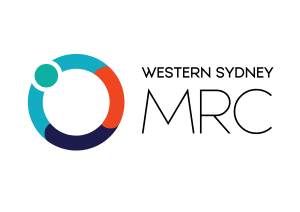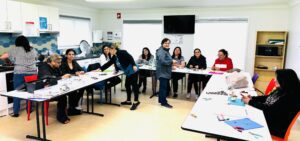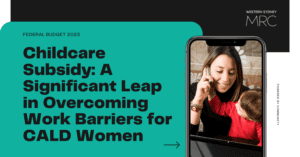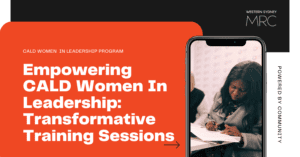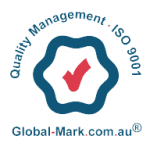A Visit from Mr Chris Minns MP and Mr Stephen Kamper MP.
It was a busy morning at Western Sydney MRC as our office has just begun reopening to the staff since lockdown. We were delighted to be welcoming Mr Chris Minns, Leader of the NSW Labor Party and Mr Stephen Kamper, the Shadow Minister for Small Business, Property and Multiculturalism, for a roundtable discussion and a presentation of our recent Pulse report. Joining them was the local Liverpool city councillor Mr Nathan Hagarty, ex-chair of the Western Sydney MRC board.
Many changes have occurred and disruptions most of us could not have imagined in 2021. On this day, we had the opportunity to sit at the table and discuss with policymakers about the concerns, issues, and community-based recommendations required to move forward. Led by Western Sydney MRC CEO Kamalle Dabboussy, the meeting began with an introduction to the organisation, its services, staff and the communities and clients seeking support and accessing services.
I can’t think of a better organization to drive that community effort.
Chris Minns MP
Western Sydney MRC staff members were present who have a direct connection to the communities on the ground and were able to relay evolving concerns in the local LGA. The staff highlighted their roles within the organisation and had an open dialogue, highlighting their united experiences over months past. Many notes were taken, and a deeper understanding was gained of not only the official role of Western Sydney MRC, but our responsive collaboration at many levels in a time of crisis.
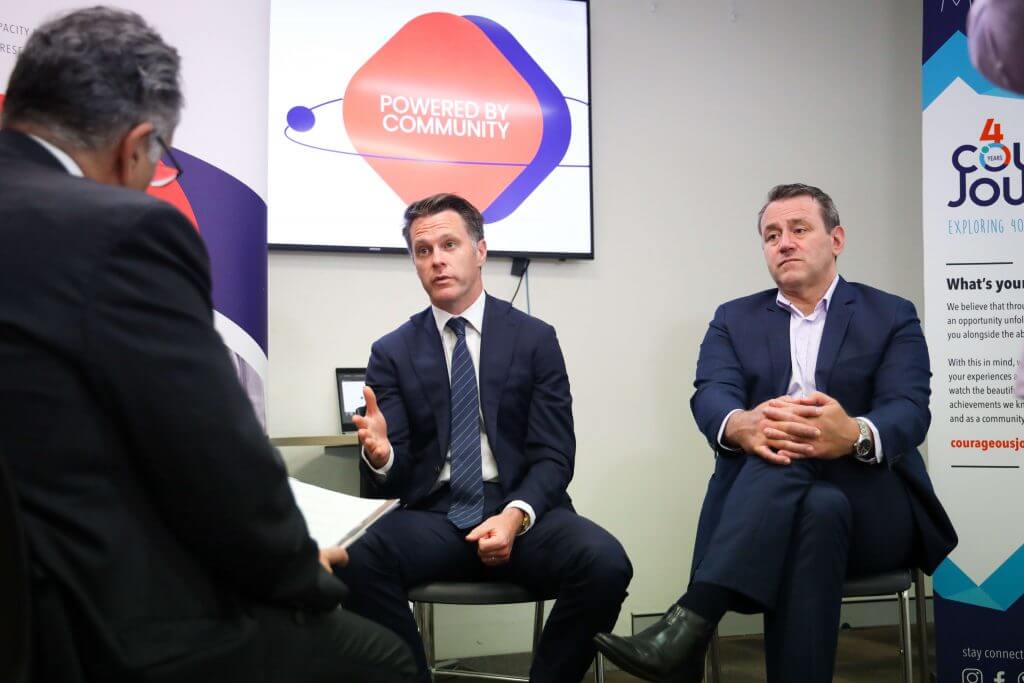

Policy Officer Dr. Archana Voola presented the findings from the Western Sydney MRC’s Pulse Report as one of many highlights of the visit. As an organisation, having rigorous survey data to outline concerns of the refugees and migrant families during the stay-at-home order was crucial to bring authentic voices to the foreground as well as the presentation adding weight to the suggested recommendations.
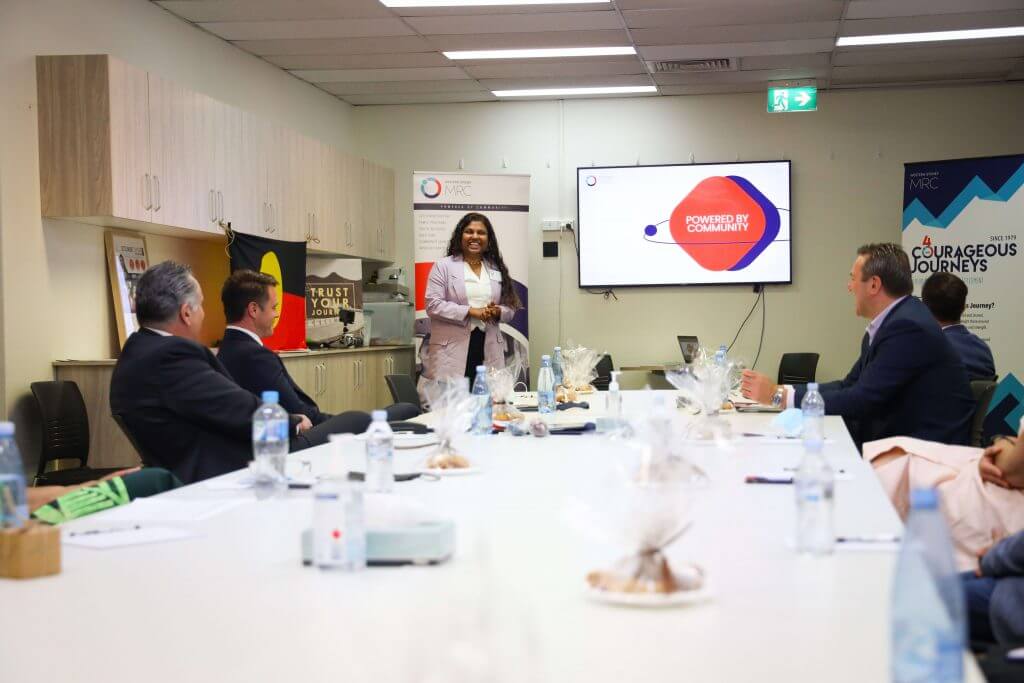

Chris Minns MP and Stephen Kamper MP joined Councillor Nathan Hagarty in leading the discussion into how future decision-making policies needed to be formulated. CEO Kamalle Dabboussy facilitated a candid interview that asked questions concerning the recovery of Western Sydney. These questions were curated directly from the local community leaders who have been working tirelessly on the frontline of the Delta outbreak in South West Sydney.
The road to recovery is complex and a call to action is required, although this requires strategy, planning and listening to ensure a successful outcome.
We look forward to working with policy leaders in the future to ensure the voices of Western Sydney are amplified and the commitment to providing the right assistance is ensured.
Thank you to MP Chris Minns, Steve Kamper MP and Councillor Nathan Hagerty for visiting Western Sydney MRC.
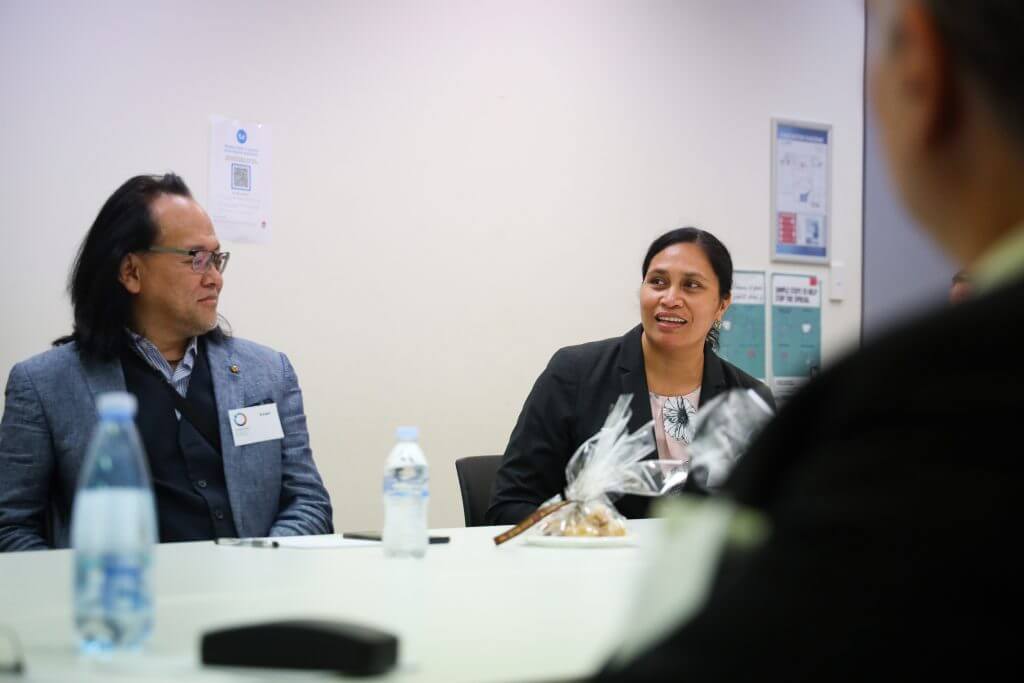

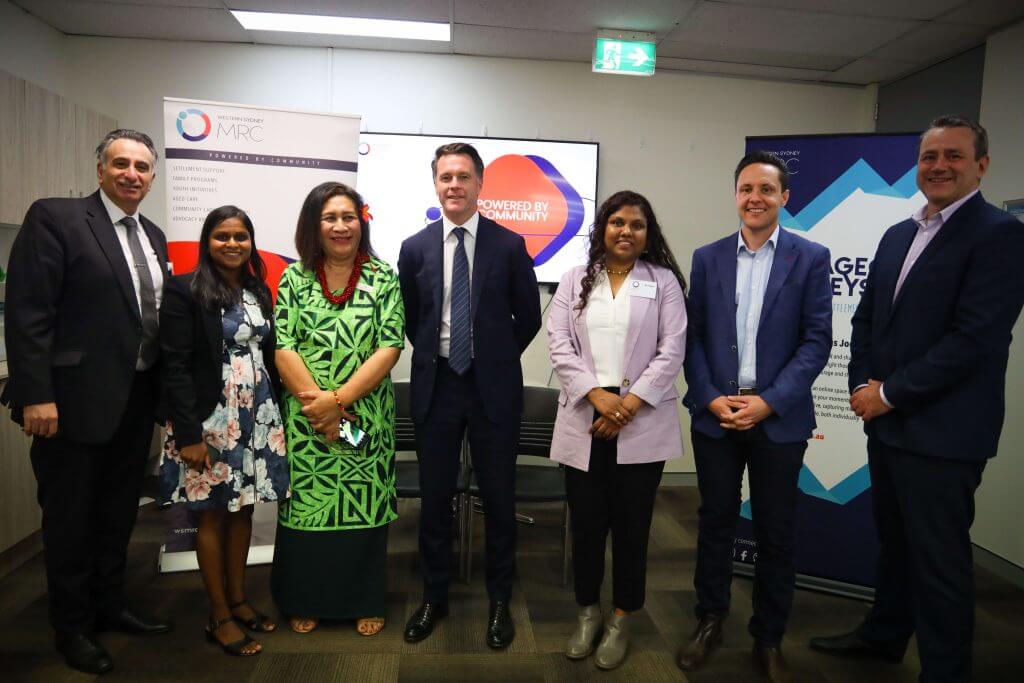

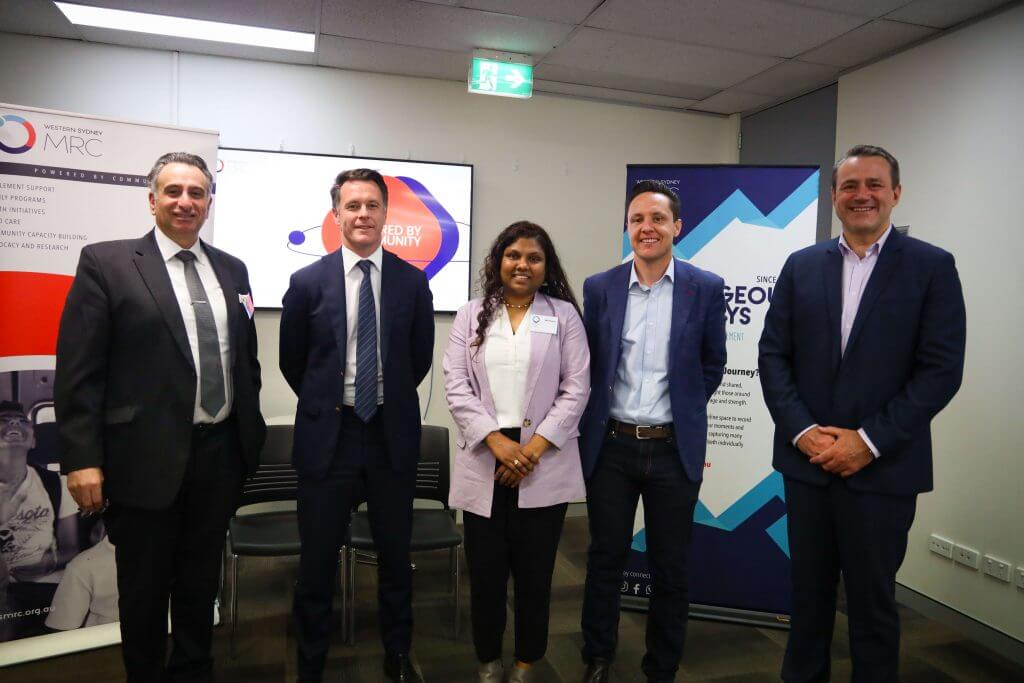

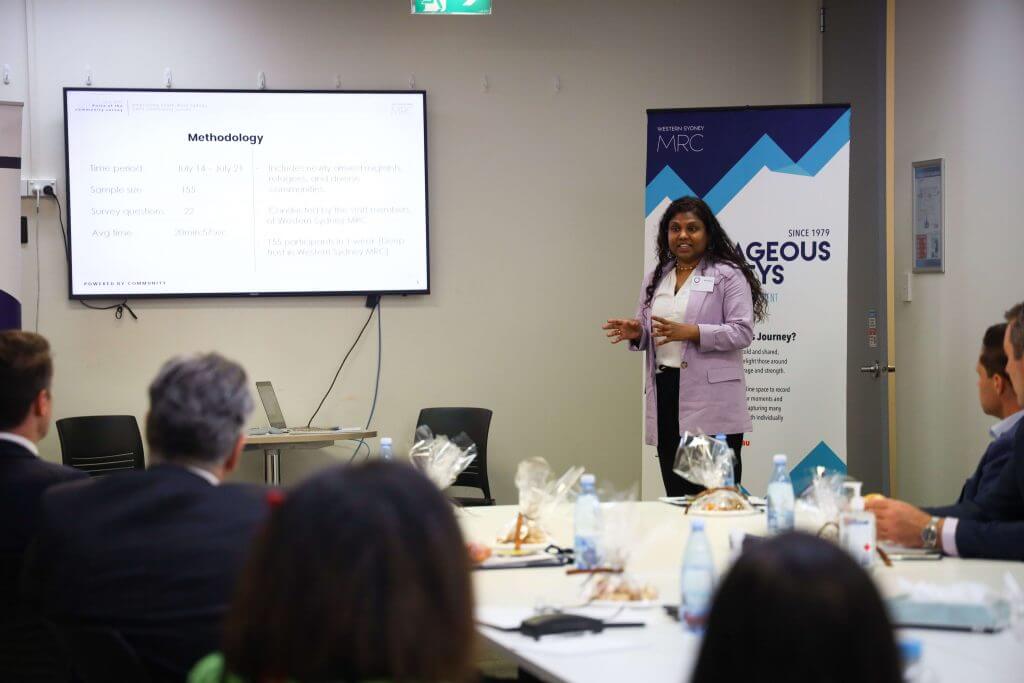

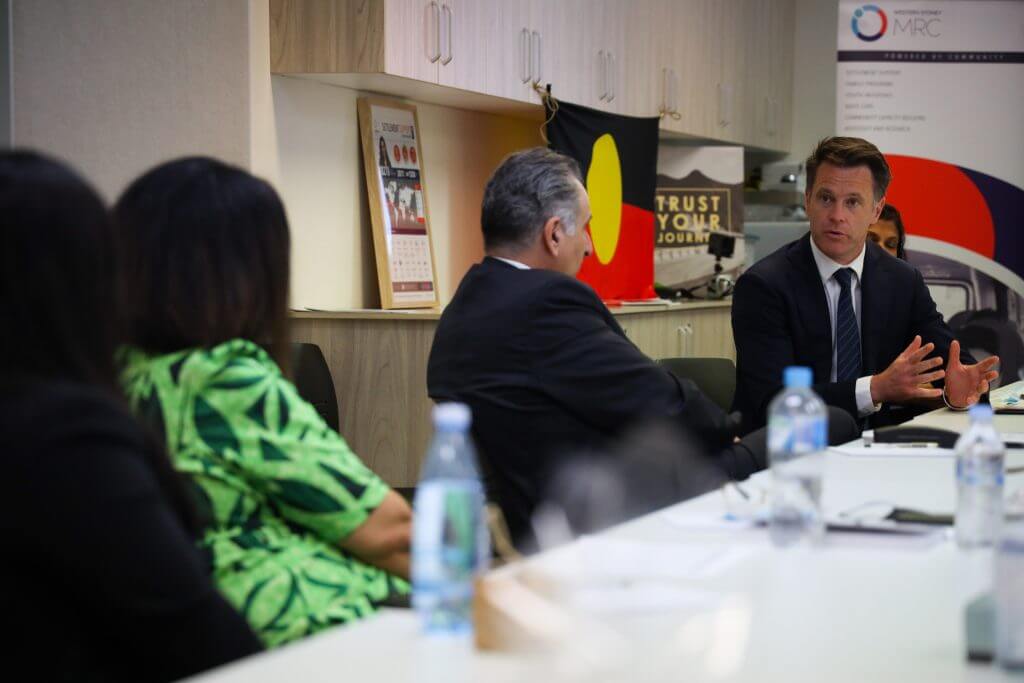

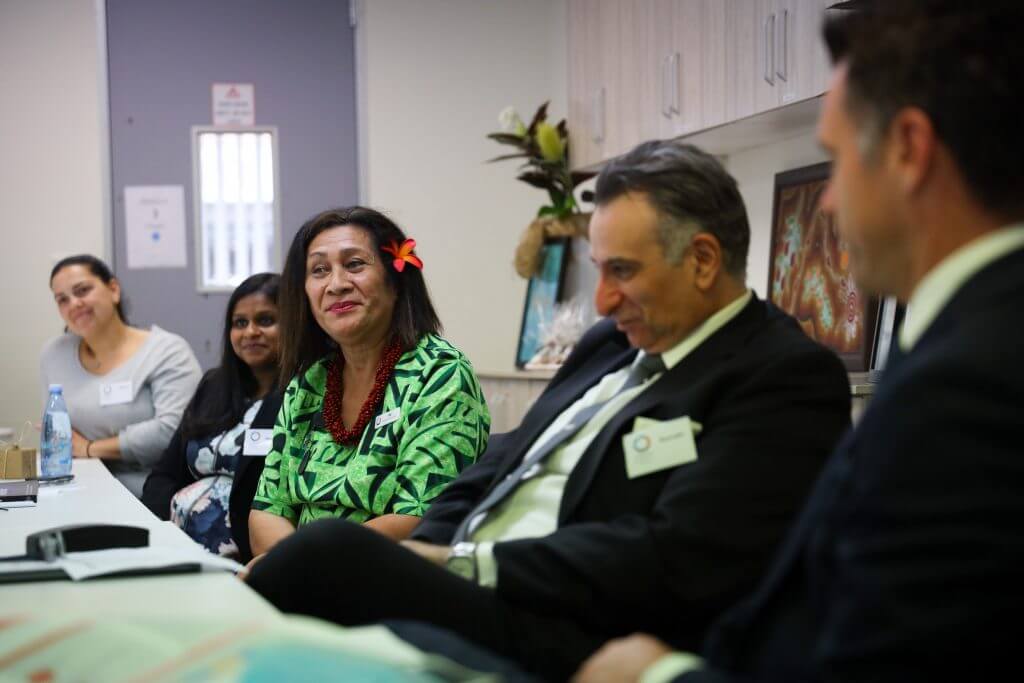

Thank you to MP Chris Minns, Steve Kamper MP and Councillor Nathan Hagerty for visiting Western Sydney MRC.
[00:00:00] Kamalle: We had Western Sydney and inner city dialogue. So moving forward what can we do to help reach the divide between two cities?
[00:00:14] Chris Minns: Yeah I think the first thing to do is to acknowledge that the people of Western Sydney in Southwestern Sydney really put their shoulder to the wheel over the last three months, they did a number of things.
[00:00:14] Chris Minns: Yeah I think the first thing to do is to acknowledge that the people of Western Sydney in Southwestern Sydney really put their shoulder to the wheel over the last three months, they did a number of things.
That’s why Steven, as the shadow minister for small businesses and myself as labor leader said the business support payments, shouldn’t be based on vaccination rates. They should be based on turnover in these individual businesses. We want communities to be whole again. And we don’t want people disadvantaged because they did the right thing and listen to their own government’s health advice.
So let’s start there, make sure Western Sydney whole, and beyond that in the longer term, we’ve got to invest in the west. That’s extremely important to make sure that economic opportunities the amount of time people spend getting to and from work and also educational opportunities are equal no matter where you live in metropolitan Sydney.
[00:01:20] Kamalle: Thank you. This then leads me to the next question you spoke about business support and that business payments that were affected go to those businesses. Is it feel amongst the community in particular that as we come out of this one and some of that business support will taper off that, in fact, there’s going to be a lasting impact on some of those smaller businesses and that micro-business term.
What would be your commitment to the small micro businesses that have been impacted by the lockdowns and will actually struggle in the recovery period. As we come out particularly understanding migrant and refugee communities are very entrepreneurial. They’ve set up a lot of small businesses?
Some of them are in a startup place to begin with how we under support some of those small businesses?
[00:02:04] Steve Camper: Absolutely I made and a lot of those smaller businesses that were heavily impacted were again in the west. And they waited a long time to get paid. Many of them, there was complex criteria.
They’ve struggled filing where they, when they got fuelled up with some support it’s phasing out. And a lot of them are not recovering at the pace that was necessary. Really the support needs to continue and, in many respects, should be somewhat targeted to support the highest impact.
[00:02:34] Kamalle: So as means labor government elected you’d actually want to continue some ongoing financial support? Would it be advice and information? What would that support look like for those small businesses moving forward?
[00:02:45] Chris Minns: We’re going to have to develop our policy for the next election and we will do that in concert with Steve, I mean you’ve got someone here that’s worked in business for thirty-five years advising literally thousands of small businesses. So I don’t think we’ve probably got a better person in the entire state to drive our agenda for small and medium size enterprises, particularly in Western Sydney. But there’s a few principles we want to talk about. Firstly, we regard Western cities, the beating heart of Sydney. We think that the entrepreneurial drive and dynamism in this part of Sydney is at its highest and best in the entire state. This is where entrepreneurs come to start businesses and we need to make sure that they’re given the help and support.
Of the government of the day to make sure that they get ahead and look, I don’t want to make this too political, but we’re going to fight for the small business vote in Western Sydney. Couple of things in the pandemic stage, probably too embarrassed to say it, but small business grants, emergency payments and help for small businesses, particularly in Western Sydney was driven by him over months and months, hammering on the door and saying, if you don’t do something about it over the next couple of weeks these businesses will collapse and fall because it’s against the law for them to open their front doors and no business should collapse or close permanently because their listened to their own government’s health advice.
So we’ve worked hard in this space. We’ve got a long way to go, but we’re going to compete vigorously for it by the time of the next election.
[00:04:02] Steve Camper: And unfortunately, during the period at one glove fits all type approach to assisting business, but sometimes you’ve got to look and say, well, who was the highest impacted?
Where was the impact? And that’s something that the government should be looking at it right now.
[00:04:18] Kamalle: I think it’s a great message to give out and you’ve done the right thing. You’ve bothered by the health advice. We now need to reinvest back. There are several current investments in our local area, we’ve got the science precinct, you got a aerotropolis, it’s a that’s come into place. We want to make sure that those local investments in those opportunities and taken advantage of by our local communities, we don’t want a train in and train out workforce for that precinct.
What commitments can we give to our local communities to be able to take advantage of those opportunities recognizing that even pre covid we had higher indicators of disadvantage, higher unemployment rates. We had lower engagement within higher education overall. So what can we do to ensure that the local community also benefits from these investments.
[00:05:03] Chris Minns: Really good question. There’s a few things too that are really important in 260,000 people lost their job over the last three months. So the most important thing is that we stimulate the economy and get them to jobs back that’s priority number one.
And we will work with the government to make sure that they, that happens, that people get their jobs, that they’ve got that future in front of them. Second part is that you need to invest in vocational education skills. So is that people in Western Sydney, the regions, anywhere that in New South Wales has opportunities to take advantage of the jobs of the future.
And I’ll leave you with some statistics. Enrolments in TAFE in new south Wales are down 150,000 placements in the last ten years. And that has a huge impact on businesses, on the ability to get skilled labor and on wages for working people. So 150,000 fewer people in TAFE there’s 5,000 fewer teachers working in TAFE and the government sold off 14 campuses.
We need to invest in vocational education. That’s the way to skill up the community. And look, the benefit from the government’s point of view is multiple because ultimately, if people have access to good training, they’ll get better jobs. They’ll pay income taxes that come back to the government in any event.
And the same is the case with business taxes and everything else. So these are costs to the budget bottom line, their investments in the future. Dynamic economies like Germany and Singapore and places right across the European union are doing exactly that they’re subsidizing cross subsidizing vocational education so that they’re getting their workforce is ready for the jobs of the future.
[00:06:32] Kamalle: Thank you very much. So we say the investment model rather than a cost spending model. We have seen in the last couple of months a surge of some support to community organizations mainly around the COVID requirements that are there, but how concerned is the longer term.
How do we ensure that some of that increased spending whether it be stimulus or support money is actually maintained to be able to address some of that longer term disadvantage that we face?
[00:06:58] Steve Camper: I think, as we discussed earlier, the value of PMSA and organizations such as wood has been highlighted and showcase during this recent period, the COVID period, and what support that you provided to the community.
And I think. It also highlights what grade investment it is for government to actually continue to support and properly fund organizations such as the MRC and give surety and the return on that investment is moving forward is you can’t put a number on it, but I think as we said earlier, it’s it was highlighted in the fact that without your support during the kind of the period we would have gone through.
[00:07:46] Kamalle: How would a Chris Minns Government ensure the relationships and engagements of all diverse communities and hard to reach communities would be maintained. We saw in the back of the current COVID situation, that where there were some existing relationships, we were able to work with those communities, but where some communities that weren’t engaged, probably the ones that needed the message most of all, it was really hard to engage with on the fact of a crisis. And I’ll give you the example of the Fiji and community, which is a diverse community in the area. There hasn’t been a lot of engagement that the community in the past. So how would you ensure engagement with those diverse committees?
[00:08:20] Chris Minns: First of all, we listened to community organizations like yours, understand what your membership saying, understand what the community view is in relation to government, community services, how we can do better. We’ll keep our ears open in the first instance and not presume that we’ve got all the answers. The second thing. I think this is probably indicative of how we’d approach it. So in the early stages of the pandemic the government announced the lockdown. They announced really restrictive measures right across new south Wales, Sydney in particular. And rather than us issuing media releases, attacking the government or calling for ministers and the premier to resign.
And we said, how can we be productive? And how can we be constructive in this health pandemic? What we decided to do is use the resources of new south Wales labor. We’ve got Greek speakers, Russian speakers, Hindi speakers. I could speak English. And we communicate with our electorates we’ve got MPS right throughout Southwestern and Western Sydney.
So we recorded messages in Italian and Serbian and Greek, Greek. And anyway, it was a wonderful effort that I think on behalf of our community to talk to our constituents about the importance of staying at home, complying with the health measures and getting vaccinated. And I think it worked and it showed the community than, rather than the labor party, even though we’re the official opposition, trying to wrench the community in two, for a political benefit, we were more committed to getting through this crisis and building together.
[00:09:43] Steve Camper: I think it means government would focus a little bit more on multicultural, new south Wales. And he’d say it’s activity, right? It rather than been a subcontract organization for government and having a more prominent role in terms of proper engaging the conviction with groups like the MRC communities.
[00:10:02] Kamalle: As a side question those same sort of language skills and community connections we would hope that you’d be able to use them as well to be able to help build the. And the recovery is not, it’s not going to be a one year or nine month exercise.
It’s probably going to be years in the process. So hopefully you use that same resources to help the recovery engagement with recovery moving forward.
[00:10:22] Steve Camper: We didn’t ever utilize these french skills.
[00:10:23] Kamalle: My last question to you both is an MRC focus question. The Western Sydney migrant resource centre being called upon to support families, particularly families with young children with higher needs, were called upon by the local schools, by families, by Department of Communities and Justice (DCJ) to work with those high needs communities, however, we’re not getting into those resources and certainly we’re not getting resources to work with high needs communities. And it’s one of the, probably the biggest gaps that we face in our ongoing service provision. Could we get a commitment from you to help work with the MRC to address those ongoing needs for those high needs children?
[00:10:57] Chris Minns: Yeah. Look, we’d love to work with you in relation to that. Obviously, it’s such an important part of a community like this, and if there’s a growing need for MRC wonderful ability to work in a crisis to work with communities that don’t necessarily speak language English as their first language and do it in a quick and efficient way.
I can’t think of a better organization to drive that community effort.
